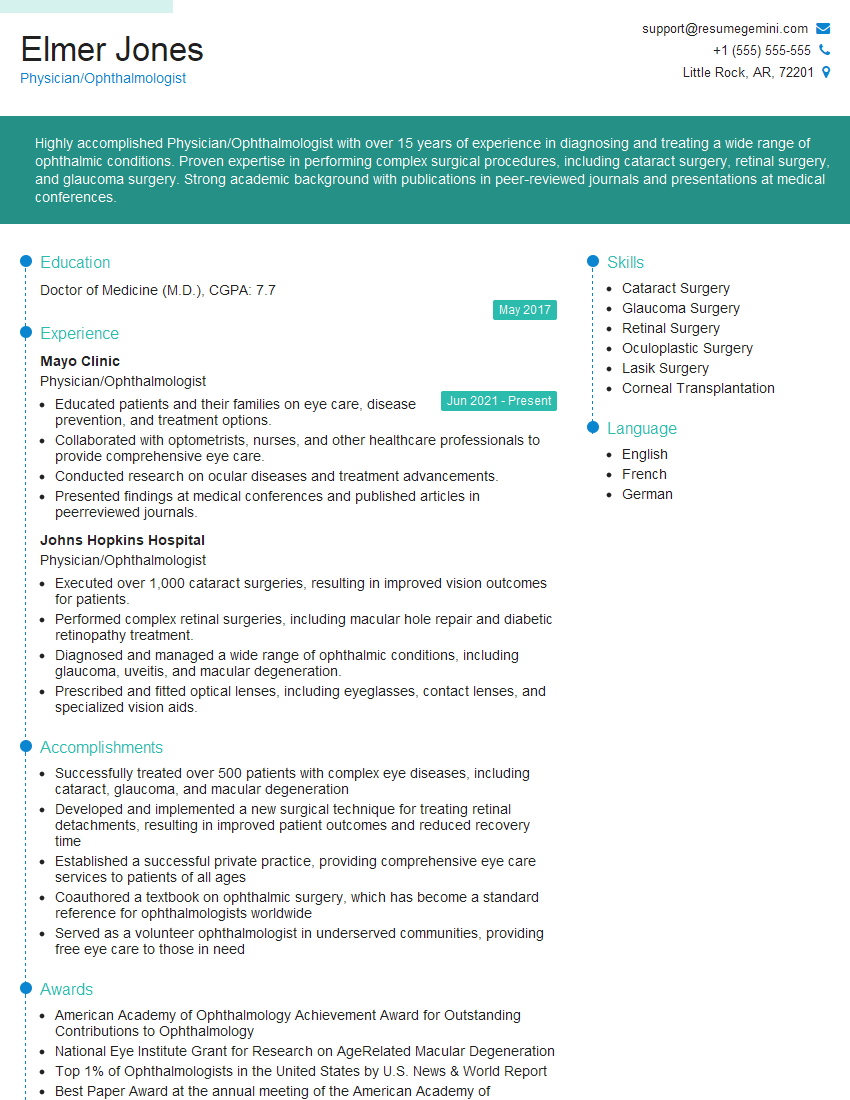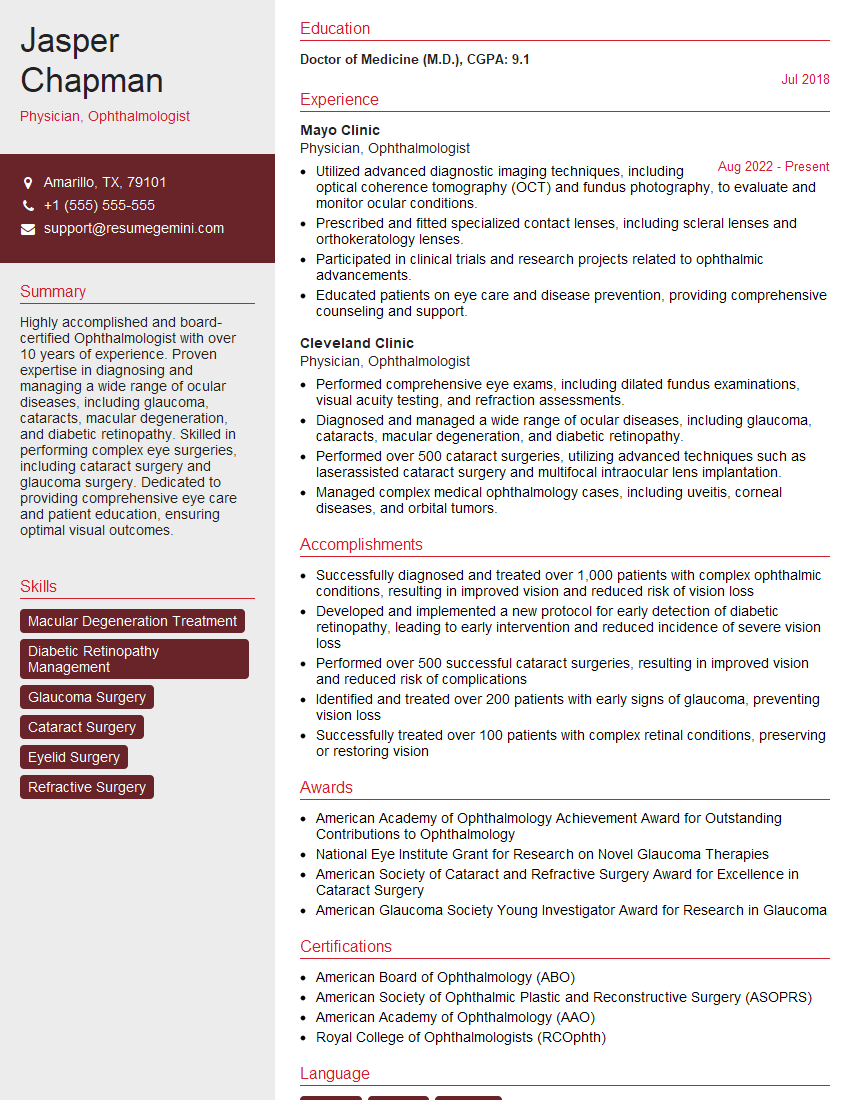Are you gearing up for an interview for a Physician/Ophthalmologist position? Whether you’re a seasoned professional or just stepping into the role, understanding what’s expected can make all the difference. In this blog, we dive deep into the essential interview questions for Physician/Ophthalmologist and break down the key responsibilities of the role. By exploring these insights, you’ll gain a clearer picture of what employers are looking for and how you can stand out. Read on to equip yourself with the knowledge and confidence needed to ace your next interview and land your dream job!
Acing the interview is crucial, but landing one requires a compelling resume that gets you noticed. Crafting a professional document that highlights your skills and experience is the first step toward interview success. ResumeGemini can help you build a standout resume that gets you called in for that dream job.
Essential Interview Questions For Physician/Ophthalmologist
1. What is the most important factor to consider when performing a comprehensive eye examination?
The most important factor to consider when performing a comprehensive eye examination is the patient’s symptoms and history. This information can help to guide the examination and identify any potential problems. Other important factors to consider include the patient’s age, risk factors, and any previous eye conditions.
2. How do you approach a patient with a complaint of blurred vision?
When a patient presents with a complaint of blurred vision, I first take a detailed history of the patient’s symptoms. I then perform a comprehensive eye examination, including a visual acuity test, a refraction, and an examination of the anterior and posterior segments of the eye. Based on the results of the examination, I can determine the cause of the blurred vision and recommend the appropriate treatment.
3. What are the latest advancements in the treatment of glaucoma?
The latest advancements in the treatment of glaucoma include the development of new medications, surgical techniques, and devices. These advancements have helped to improve the outcomes of glaucoma treatment and have reduced the risk of vision loss. Some of the most recent advancements include the development of new classes of glaucoma medications, such as prostaglandin analogs and rho kinase inhibitors, and the development of new surgical techniques, such as minimally invasive glaucoma surgery (MIGS).
4. How do you manage a patient with diabetic retinopathy?
The management of diabetic retinopathy involves a multidisciplinary approach that includes regular eye examinations, medical treatment, and laser surgery. Regular eye examinations are essential for early detection and treatment of diabetic retinopathy. Medical treatment may include the use of anti-VEGF medications or corticosteroids to reduce inflammation and prevent vision loss. Laser surgery may be used to treat diabetic macular edema or to prevent the development of proliferative diabetic retinopathy.
5. What are the ethical considerations in the management of a patient with age-related macular degeneration (AMD)?
The ethical considerations in the management of a patient with AMD include the patient’s right to informed consent, the patient’s autonomy, and the patient’s quality of life. The patient should be fully informed about the risks and benefits of treatment options and should be involved in the decision-making process. The patient’s autonomy should be respected, and the patient’s wishes should be taken into consideration when making treatment decisions. The patient’s quality of life should be considered when making treatment decisions, and the patient’s goals for treatment should be taken into account.
6. How do you manage a patient with a corneal ulcer?
The management of a corneal ulcer involves a combination of medical treatment and surgical intervention. Medical treatment may include the use of antibiotic eye drops, antifungal eye drops, or antiviral eye drops. Surgical intervention may be necessary if the corneal ulcer is severe or does not respond to medical treatment. Surgical intervention may include corneal scraping, corneal debridement, or corneal transplantation.
7. What is the role of the ophthalmologist in the management of a patient with cataracts?
The role of the ophthalmologist in the management of a patient with cataracts is to provide a comprehensive eye examination, discuss the risks and benefits of cataract surgery, and perform cataract surgery if indicated. The ophthalmologist will also provide post-operative care and follow-up.
8. How do you manage a patient with a retinal detachment?
The management of a retinal detachment involves a combination of medical treatment and surgical intervention. Medical treatment may include the use of anti-VEGF medications or corticosteroids to reduce inflammation and prevent further retinal detachment. Surgical intervention is typically necessary to repair the retinal detachment. Surgical intervention may include scleral buckling, pneumatic retinopexy, or pars plana vitrectomy.
9. How do you manage a patient with uveitis?
The management of uveitis involves a combination of medical treatment and surgical intervention. Medical treatment may include the use of topical corticosteroids, systemic corticosteroids, or immunosuppressive medications to reduce inflammation and prevent further damage to the eye. Surgical intervention may be necessary if the uveitis is severe or does not respond to medical treatment. Surgical intervention may include vitrectomy or lensectomy.
10. How do you manage a patient with a strabismus?
The management of strabismus involves a combination of medical treatment, vision therapy, and surgical intervention. Medical treatment may include the use of eyeglasses or prisms to correct the eye alignment. Vision therapy may be used to improve eye coordination and muscle strength. Surgical intervention may be necessary if the strabismus is severe or does not respond to medical treatment or vision therapy.
Interviewers often ask about specific skills and experiences. With ResumeGemini‘s customizable templates, you can tailor your resume to showcase the skills most relevant to the position, making a powerful first impression. Also check out Resume Template specially tailored for Physician/Ophthalmologist.
Career Expert Tips:
- Ace those interviews! Prepare effectively by reviewing the Top 50 Most Common Interview Questions on ResumeGemini.
- Navigate your job search with confidence! Explore a wide range of Career Tips on ResumeGemini. Learn about common challenges and recommendations to overcome them.
- Craft the perfect resume! Master the Art of Resume Writing with ResumeGemini’s guide. Showcase your unique qualifications and achievements effectively.
- Great Savings With New Year Deals and Discounts! In 2025, boost your job search and build your dream resume with ResumeGemini’s ATS optimized templates.
Researching the company and tailoring your answers is essential. Once you have a clear understanding of the Physician/Ophthalmologist‘s requirements, you can use ResumeGemini to adjust your resume to perfectly match the job description.
Key Job Responsibilities:
As a Physician/Ophthalmologist, your primary responsibility is to maintain and enhance the eye health of patients. Your key job responsibilities include:
1. Patient Care:
Provide comprehensive eye care, including diagnosis, treatment, and management of a wide range of eye conditions and diseases.
- Conduct comprehensive eye examinations to assess visual acuity, eye alignment, pupil response, and other vision-related functions.
- Diagnose and treat eye infections, injuries, and diseases using various medical and surgical procedures.
2. Surgical Procedures:
Perform surgeries to correct eye disorders and improve vision, such as cataract surgery, glaucoma surgery, and corneal transplants.
- Plan and execute surgical procedures with precision, using advanced surgical techniques and equipment.
- Monitor patients’ progress during and after surgery to ensure optimal outcomes.
3. Patient Education:
Educate patients about eye health, disease management, and the importance of regular eye examinations.
- Provide clear and understandable explanations of eye conditions and treatment options to patients and their families.
- Promote healthy eye habits and lifestyle choices to prevent eye problems.
Interview Tips and Preparation Hacks:
To ace your interview for a Physician/Ophthalmologist position, follow these essential tips:
1. Research the Hospital and Position:
Thoroughly research the specific hospital and the position you’re applying for. This demonstrates your interest and shows that you’ve taken the time to understand the institution’s mission, values, and specific needs.
- Visit the hospital’s website to learn about its history, services, and areas of specialization.
- Review the job description carefully to identify key responsibilities, skills, and qualifications.
2. Highlight Transferable Skills and Experiences:
Even if you don’t have direct experience as an Ophthalmologist, emphasize transferable skills and experiences that are relevant to the role.
- Example: If you’re a medical resident specializing in another field, showcase your surgical skills, patient management experience, and knowledge of ophthalmology principles.
3. Prepare Specific Examples:
During the interview, be prepared to provide specific examples that demonstrate your skills and accomplishments.
- Example: Use the STAR method to share a situation where you successfully diagnosed and treated a complex ophthalmic condition.
4. Practice Common Interview Questions:
Anticipate and prepare for common interview questions, such as:
- “Tell us about your clinical experience and how it relates to this role.”
- “Describe a challenging case you managed and the steps you took to provide excellent patient care.”
Next Step:
Armed with this knowledge, you’re now well-equipped to tackle the Physician/Ophthalmologist interview with confidence. Remember, preparation is key. So, start crafting your resume, highlighting your relevant skills and experiences. Don’t be afraid to tailor your application to each specific job posting. With the right approach and a bit of practice, you’ll be well on your way to landing your dream job. Build your resume now from scratch or optimize your existing resume with ResumeGemini. Wish you luck in your career journey!

